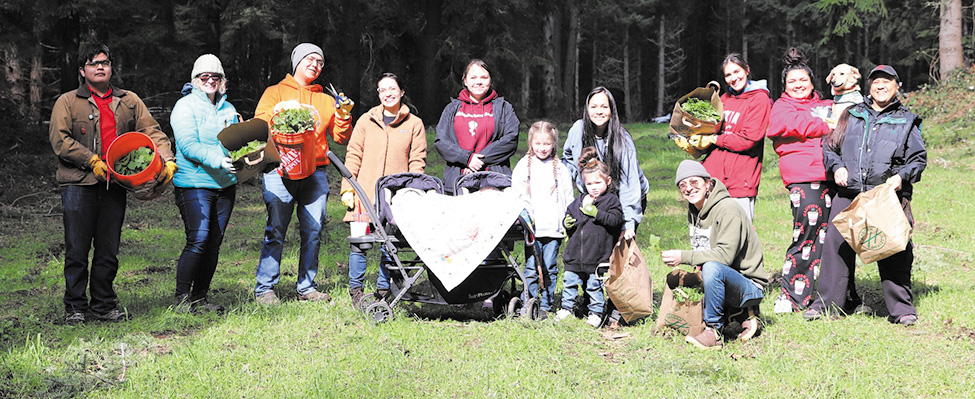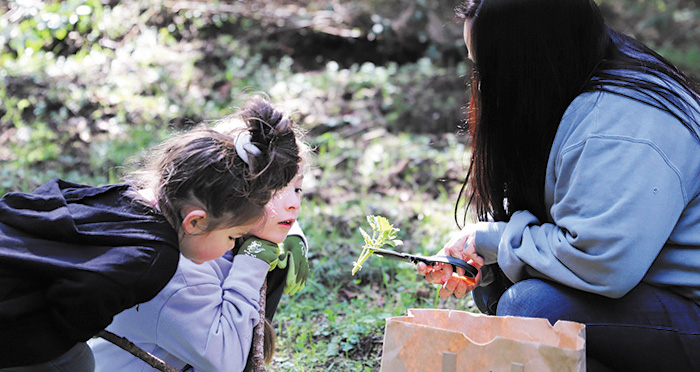
By Kalvin Valdillez, Tulalip News
Across the land, and within each tribe, many Native Americans are fortunate and blessed to grow up surrounded by the culture. Learning the ways of our ancestors who came before us, tribal members are often gifted knowledge at numerous intervals throughout our lives, whether that be our traditional languages, the importance of ceremony, or how to live and thrive of the land, several teachings are passed through the generations. Countless tribal members develop a strong cultural identity at a young age, and that foundation helps keep our way of life alive and is in-turn taught to the future leaders – a beautiful cycle. Which is amazing considering that our traditions were once outlawed with the intention of being completely erased and stripped away during the era of forced assimilation.
However, there is a percentage of Natives who aren’t raised within the culture, especially in today’s modern society. Maybe they grow-up away from their homelands, and only visit their reservations every so often. Or perhaps, with the everyday hustle, their families can’t attend local cultural happenings as often as they would like. And of course, there are those who simply haven’t gravitated to their traditional lifeways just yet. But that doesn’t necessarily mean they do not want to get involved at some point in their lifetime.
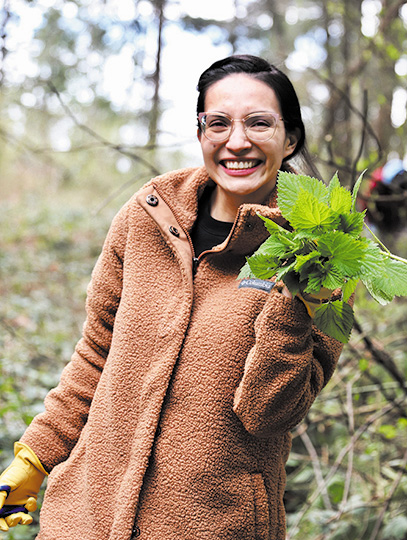
For those individuals who are ready to learn their ancestral teachings, where do they begin? How do they attain that foundation, that base of knowledge to the point where they can practice their traditions with confidence in both a group and personal setting, without feeling awkward, embarrassed or looked-down upon? These are common concerns for urban Natives and others who grew up outside of the culture, especially at large gatherings when you are expected to just jump-in.
The answer comes in the form of a newly established, non-profit organization called Indigenous Beginnings. Founded by Nooksack tribal member and Tulalip community member, Stephanie Cultee, Indigenous Beginnings hosts a variety of cultural workshops and helps tribal members connect to their traditional lifeways.
“Indigenous Beginnings started after COVID happened,” explained Stephanie. “All the programs were kind of shut down, and I thought that it was possible to host a workshop in a safe environment while still practicing our ways. The organization is geared toward passing down the knowledge, so it stays alive and preserving it. There was a whole generation that couldn’t practice or learn their ways from their grandparents because of the boarding school era. And there are a lot of programs that happen at each tribe, but they are all kind of geared towards the youth, and I always felt left out. What about us who aren’t youth? It would always feel weird to attend those events and programs.”
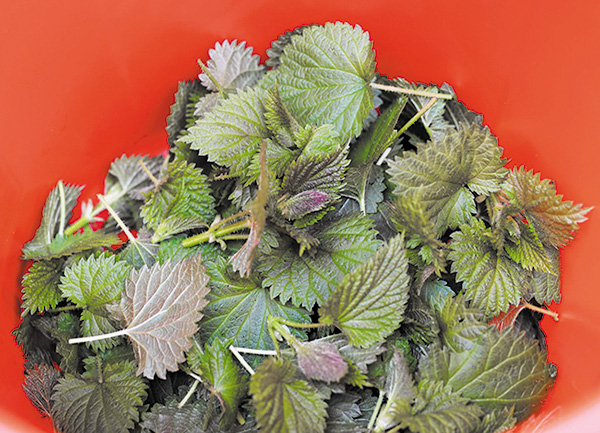
She continued, “With Indigenous Beginnings, all of our workshops are for all ages. For those older generations who want to learn, they could come and don’t have to feel weird about it. I am from Nooksack and moved down here when I was fifteen. I have three daughters who are Tulalip, and I want them to learn their Tulalip heritage and Nooksack’s as well because they are descendants from Nooksack too. I didn’t know much about my tribe, because I moved away when I was young, and I thought this could be a way that I could teach them, and a way that I can learn as well.”
Officially established in the late summer of 2021, the non-profit has already hosted numerous workshops over the past several months. Over ten in fact, and each project is different, so the participants are always learning something new or receiving a fun and interactive refresher. So far, Indigenous Beginnings has hosted harvesting classes, and gathered devil’s club, fireweed and mountain huckleberries, as well as a number of carving classes where participants crafted canoe paddles, fish sticks and cedar earrings. Other classes included a two-part beading seminar, a drum making workshop, and a salmon canning lesson.
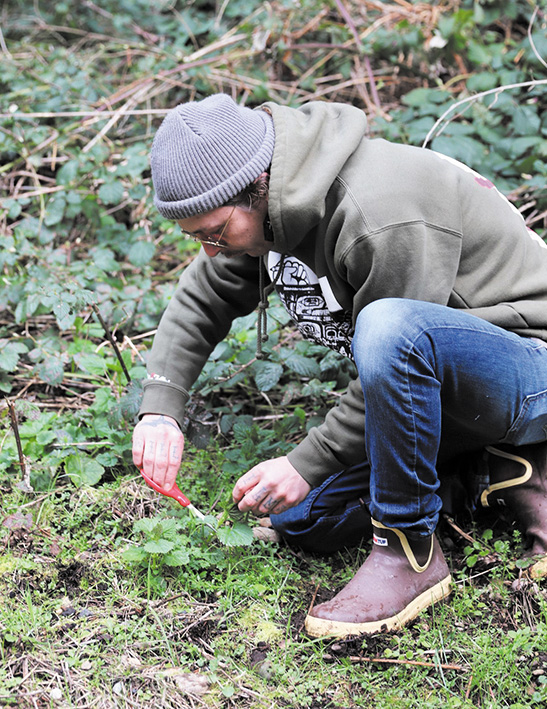
For their most recent gathering, a stinging nettle harvesting workshop, the organization enlisted Tulalip tribal member Thomas Williams to lead the class. On the frosty morning of March 6, approximately a dozen participants met at a clearing in a nearby forest, a local area known as Arcadia.
After teaching the group Lushootseed words for several local Indigenous plants, Thomas shared, “I arrived early in the morning as the birds were still waking and I prayed for the work we are doing today. Before you start harvesting, I ask that you get yourself in a healthy state of mind and let the plant know that you’re a good person and that you come in a good way. That’s part of why I feel that it doesn’t sting me as much, because I have a relationship with this plant and I’m learning how to protect it.
This is our land, and it’s our responsibility to protect it. If we’re coming here and utilizing the medicine, it’s our responsibility to also use our ability to speak and stick up for these resources. We need your help protecting this area so that future generations can continue to come here and utilize that medicine.”
Thomas then demonstrated harvesting techniques while informing the participants what and where to look for when harvesting the stinging nettle plant, indicating that they grow in families and can be seen along the tree lines. Equipped with gloves, buckets and a pair of scissors, the group spent two hours scouring Arcadia for stinging nettles and discussed amongst themselves how they would utilize the plant after the day’s bounty was collected. During this time, the group also shared stories, laughter, prayers and songs, providing each other with the medicine of good company while they worked.
“When you harvest nettles, you talk to them and let them know who you are, who your family is, and that you’re there with good intentions,” said young Tulalip tribal member, Kaiser Moses. “You let them know that you care about the plants, and you care about the environments that the plants exist within. This is important to me because it makes good tea, it’s good in stews and it has good practical benefits, but it also connects me to the environment that I exist in. The forests I drive-by every day, I walk in them and have a connection to them. That plays a big part in my life, because I need the grounding that it provides.”
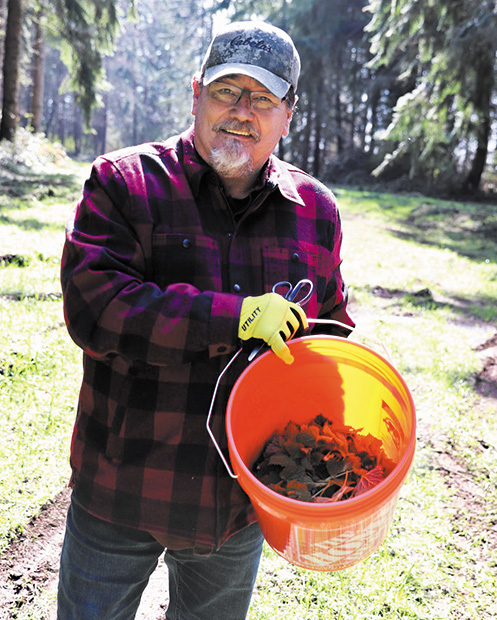
Many participants echoed Kaiser’s sentiment about feeling connected, not only to the culture, but also to the natural world while taking part in the Indigenous Beginnings workshop. Tulalip tribal member Kali Joseph noted that this work is important for our people going forward and continuing to learn and pass on the knowledge of our ancestors.
Said Kali, “It was so cool, and it was super healing. I felt very connected to the land today. It was an honor to be a part of this. It makes me so thankful for Stephanie’s organization because it brings the culture to the people. This was my first-time harvesting stinging nettle. I’m really looking forward to using the medicine further and maybe making a pesto and dehydrating some for a tea. I know that sometimes it’s hard to get connected to your culture when life is so busy, with work and school and other things. So, just to take some time, where everything is set-up for you, where she facilitates it for you, and your instructor teaches you how to harvest and how to use what you harvest further. I think it’s awesome to be a part of.”
She added, “It’s important, the work that we do to sustain and revitalize our culture, because as Native people, we have lots of healing to do and I think that we could utilize this type of work to collectively heal. Indigenous Beginnings is thinking about what’s in the best interest for the next seven generations. Everything we do today has a ripple effect down the next seven generations. And since this my first-time learning, and my little sisters first time learning, we’ll be able to pass those teachings on to many generations down the line.”
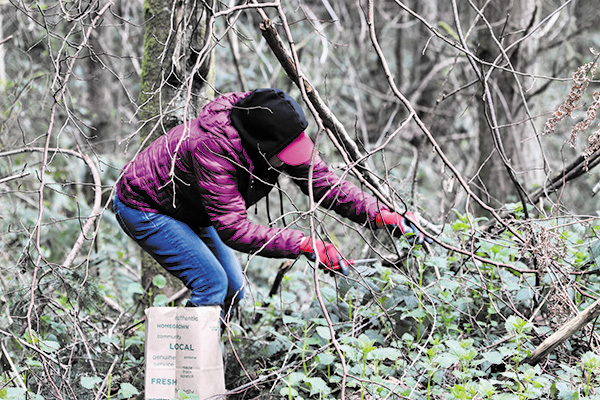
There are many fun and exciting events and classes planned for Indigenous Beginnings that the people can look forward to over the next couple of months as the weather warms up. In addition to more harvesting workshops, rose hips and morel mushrooms are due up next, the non-profit is in the process of coordinating a cedar-pulling workshop, as well as a cedar weaving lesson.
It is Stephanie’s goal to host workshops on different reservations, in addition to both of her homes at Tulalip and Nooksack, and get other local tribes involved in the organization. She also has aspirations of starting a hiking club, where participants can journey, by foot, through their ancestral homelands. Indigenous Beginnings also commissioned a cedar strip canoe from Canadian Native carver Neil Russell, which should be completed before the end of spring. They will teach participants how to pull the canoe out on the open waters.
Stephanie shared, “I want this to be a model, the framework, so other tribal members can form their own branches of Indigenous Beginnings, like Muckleshoot Indigenous Beginnings workshops. Or maybe Alaska, because there’s a lot of Alaskan Natives here in Washington and they could start their own. This is also a great way for our teachers to get funding, to compensate them because they are teaching our traditional ways. It’s mind blowing that there are still people who hold that knowledge, those teachings, and we just want to help pass that knowledge on.”
Indigenous Beginnings is currently looking to add a board member to their team who can advocate for the organization, build connections, assist in fund raising opportunities and attend all of their meetings. If you are interested, or if you would like to find out more about the non-profit, please visit their Facebook page for more information.
